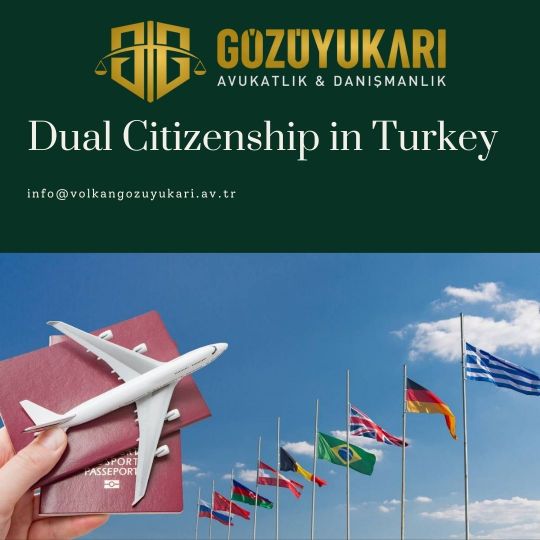Dual Citizenship in Turkey
Türkiye’de Dual Nationality
Dual Citizenship in Turkey is a condition when someone is allowed to hold citizenship to more than one country. When it comes to dual citizenship, circumstances may differ according to different policies and laws that countries apply. With this blog, we would like to inform you about Turkey’s policy in this subject.
- Turkish citizens that have other countries citizenship: Turkish citizens may become another country’s citizen without renouncing Turkey’s citizenship. Since every country has different policies, Turkish citizens who would like to apply for another country’s citizenship need to follow that country’s regulations. Turkey generally doesn’t limit dual citizenship and allows its citizen to become another country’s citizen as well. Although some countries’ regulations may not allow its citizens to become Turkey’s citizens.
- Foreigners to hold Turkey citizenship: If a foreigner wants to become Turkish citizen, he/she needs to follow Turkish regulations.There are several ways to do so:
- Through marriage
- Through investment
- Through special abilities or services.
An alien’s application to become a Turkish citizen may vary depending on Turkey’s citizenship laws and policies.Applications usually go through the Turkish Ministry of Internal Affairs and it can be very complex. This is why it’s very important to research application requirements in detail and contact local experts before applying.
Turkey has several agreements with other countries regarding granting citizenship. These agreements make it easier for citizens of two countries to acquire citizenship in each other’s countries.
Countries listed below grant citizenship along with Turkey:
- European Nation Countries:Turkey is a party to the Dual Citizenship Registry signed with the European Union in 1999. As in the agreement, dual citizenship between Turkey and EU member states has been released, effective from 2005.
- Organisation for Economic Co-operation and Development partner countries:Turkey has several agreements about granting citizenships with partner OECD countries.
- United Nations countries: Turkey has several agreements about granting citizenships with other UN countries. These agreements simplify the process for both countries’ citizens to grant other partner countries citizenship.
Notice that while some countries fully accept dual citizenship, some only accept under specific circumstances.
Turkish citizenship may only be granted by:
- Birth: A child born with a Turkish mother and father, is granted Turkish citizenship from birth.
- Lineage: If a person’s mother and father is a Turkish citizen, then that person also may apply for Turkish citizenship.
- Marriage: Foreigner that marries a Turkish citizen, may apply to Turkish citizenship after 3 years.
- Naturalization: Foreigners that stayed in Turkey for 5 years and know about Turkish culture and language, may apply for Turkish citizenship through the naturalization process.
- Investment: Foreigners that make a certain amount of investment in Turkey, may apply to Turkish citizenship through the naturalization process.
Agreements between Turkey and citizenship-granting countries may allow people who have obtained citizenship in one of these ways to also obtain the citizenship of the other country.
How Many Citizenship May Be Obtained?
Generally, a person may hold more than one citizenship. Yet, it is up to related countries’ regulations and policies.
While some countries allow dual citizenship, some don’t accept and forbids.
Rules and limitations on dual citizenship may vary depending on factors such as a person’s current citizenship status, marriage, place of birth, special abilities or investment. Some countries may grant citizenship to foreign nationals while allowing them to retain their current citizenship.
To get precise information about the right or conditions for dual citizenship, it is important to contact a country’s consulate or embassy and review that country’s citizenship laws. Additionally, when exercising your right to dual citizenship, it is important to comply with the laws and obligations of both countries.
What Are Advantages Of Dual Citizenship?
- Dual Citizenship in Turkey may profit from both countries’ rights. For instance dual citizens generally have more choices in education, health, travel and working areas.
- Dual citizens have the opportunity to learn and experience both countries’ culture and language.
- Dual citizens get more international business opportunities by using their status.
However, dual citizenship may also have some disadvantages. For example, people with dual citizenship may be subject to double taxation. Additionally, people with dual citizenship may be called up for military service.
Does Turkey Allow Dual Citizenship?
Turkey, as a country with a rich cultural heritage and a diverse population, has a particular stance regarding Dual Citizenship in Turkey. The Turkish government allows its citizens to hold dual citizenship under specific circumstances and in compliance with certain regulations.
For individuals considering obtaining dual citizenship in Turkey, it’s crucial to understand the criteria set forth by Turkish laws. According to Turkish nationality law, Turkish citizens who acquire another nationality by birth, marriage, or naturalization in a foreign country are generally permitted to hold dual citizenship.
However, it’s essential to note that while Turkey generally allows dual citizenship, certain situations might lead to the loss of Turkish citizenship. For instance, a Turkish citizen who voluntarily acquires citizenship from another country without permission from the Turkish authorities might face potential loss of their Turkish citizenship.
Furthermore, individuals of Turkish descent living abroad might be eligible to apply for Turkish citizenship without relinquishing their current nationality. The laws and regulations regarding dual citizenship in Turkey can be intricate and subject to change, thus necessitating individuals to seek up-to-date information and guidance from official sources or legal experts.
Dual citizenship can offer numerous benefits, including access to more extensive social and economic opportunities, easier travel between countries, and maintaining strong ties with multiple cultures. It can also facilitate familial relationships and inheritance matters across borders.
Nevertheless, potential dual citizens should be aware of the responsibilities associated with holding citizenship in multiple countries. They might be subject to obligations such as fulfilling military service requirements, paying taxes, and complying with the laws of both countries.
Turkey generally permits dual citizenship, offering individuals the possibility of maintaining connections with Turkey while embracing citizenship from another nation. However, it is crucial to navigate the legal requirements carefully to ensure compliance with Turkish laws and regulations regarding dual citizenship
IMPORTANT:
This article is general information about Dual Citizenship in Turkey and does not constitute legal advice. Before taking any action regarding dual citizenship, it is recommended that you research the legislation and conditions of the relevant country and consult a lawyer.
Related Posts






